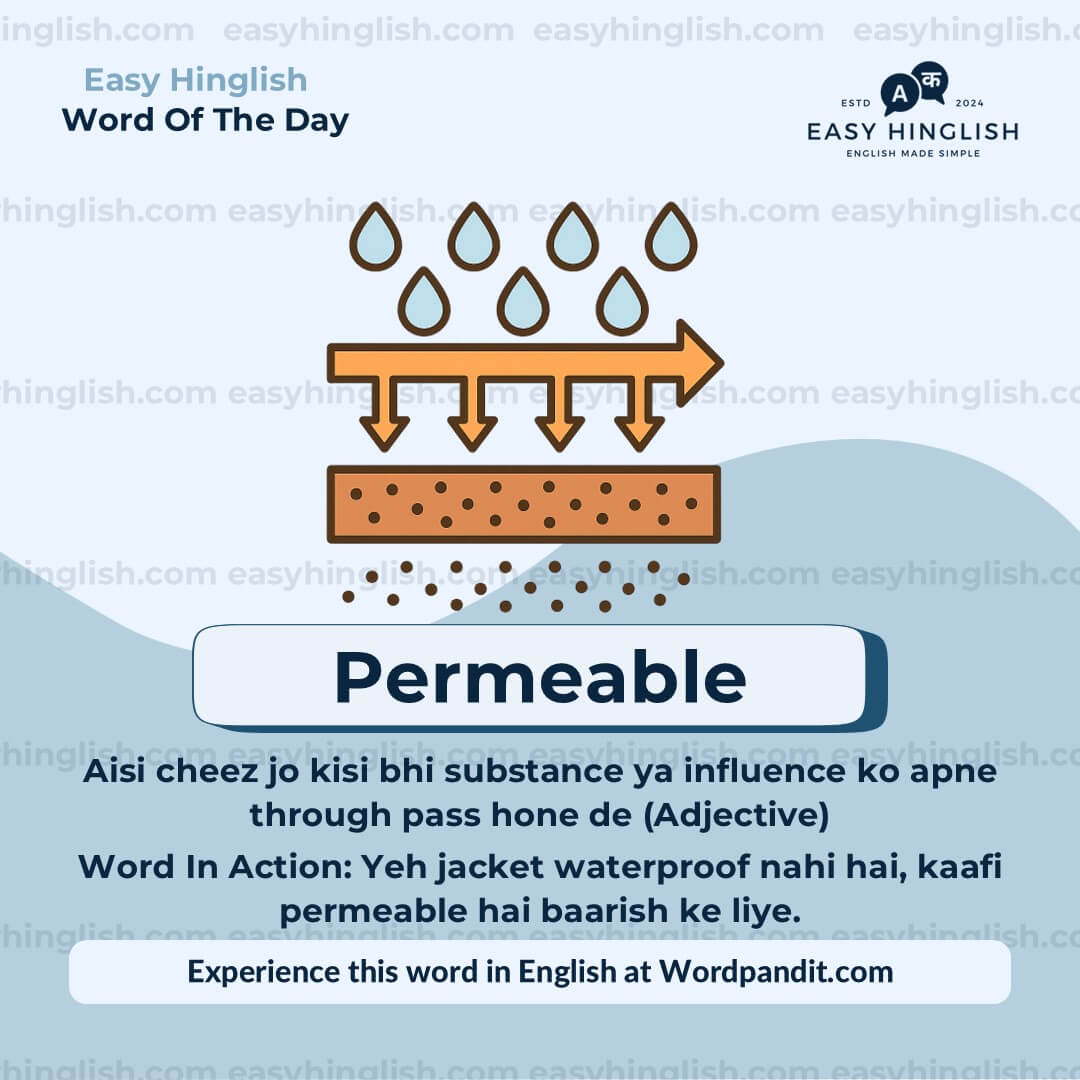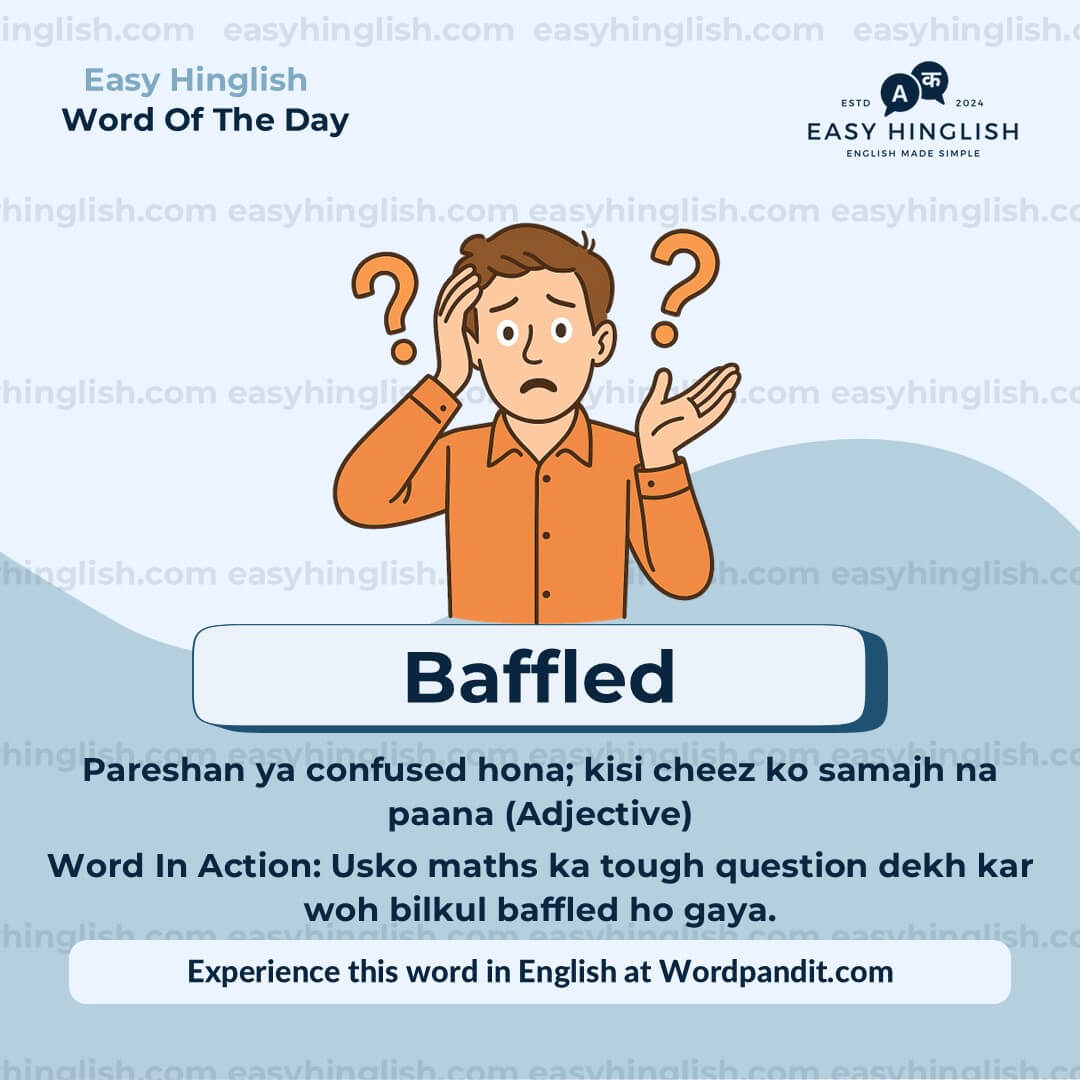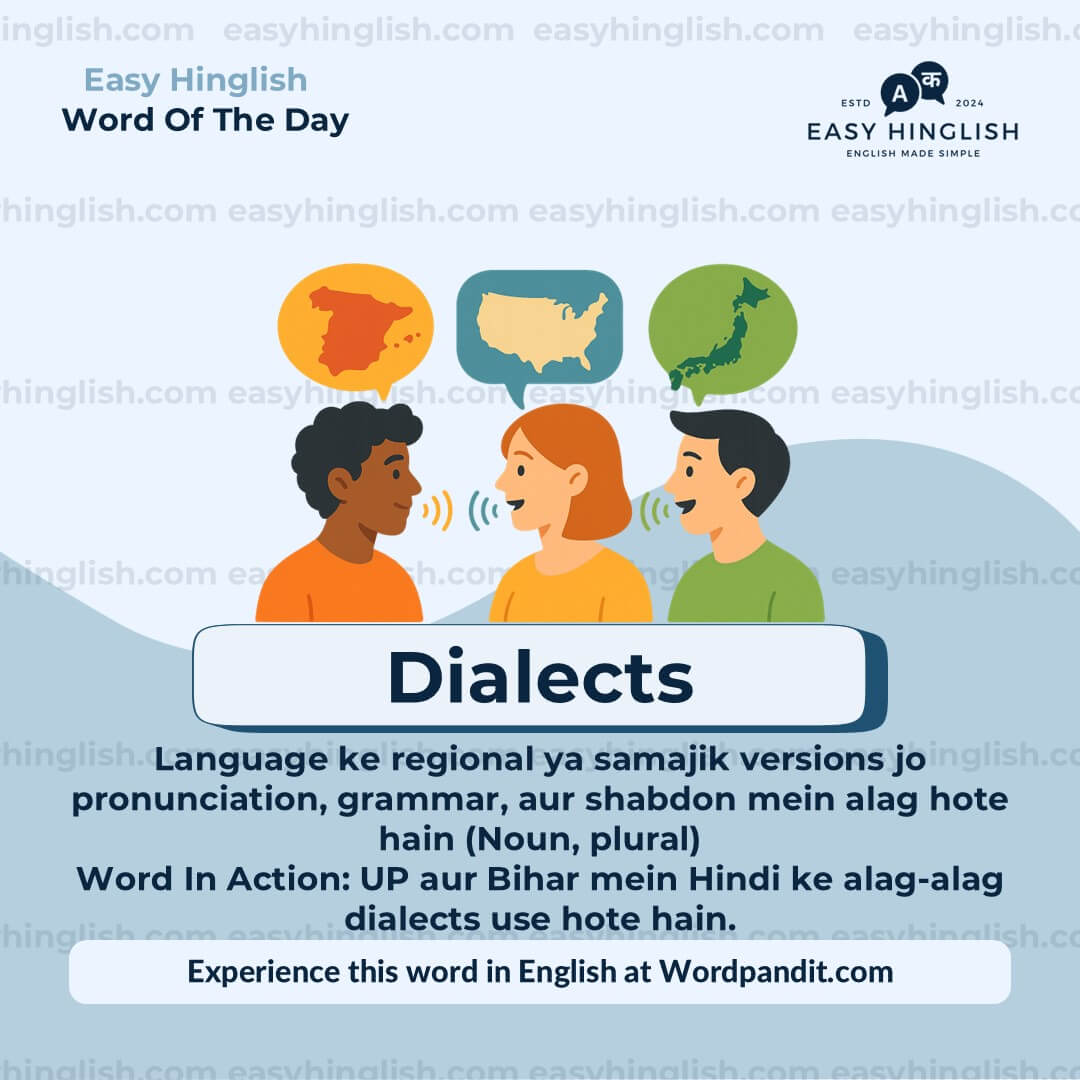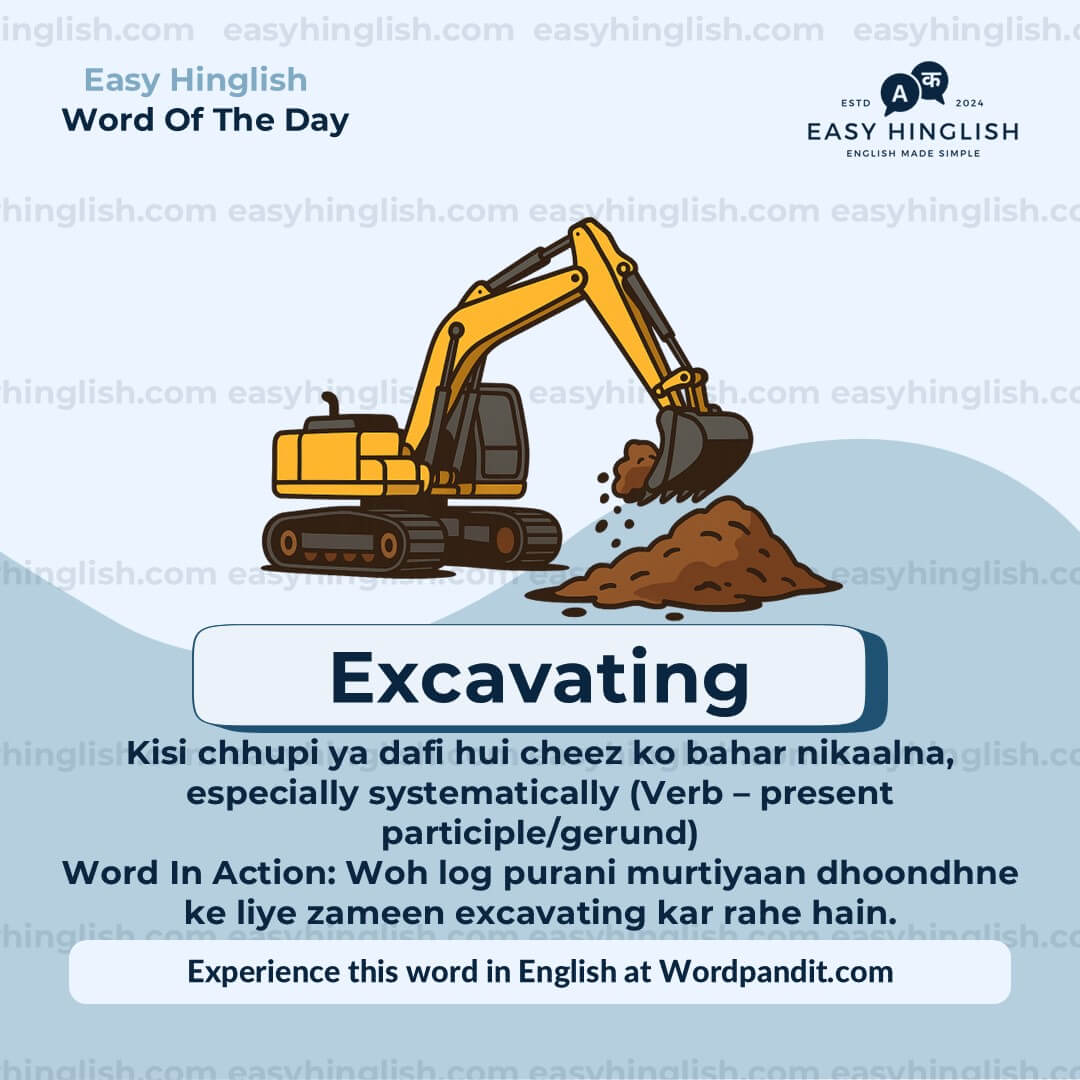Daily Vocabulary International Newspapers aur Publications se Seekho
Wordpandit ke Global Vocabulary Hub ke Saath Apni Vocabulary Expand Karo
Wordpandit par, hum aapko ek truly global vocabulary develop karne me madad karte hain, jo duniya ke sabse respected international publications se li gayi hoti hai. Yeh section aapko naye words se introduce karne ke liye design kiya gaya hai jo global conversations aur trends ko define karte hain.
Global Sources ka Power
Aapko globally sochne aur communicate karne me madad dene ke liye, hum vocabulary curate karte hain world ke top international sources se, jaise:
- The New York Times
- The Washington Post
- BBC
- The Guardian
- The Economist
- Scientific American
- Psychology Today
- Aur bhi bahut saare...
Globally Socho, Competitively Seekho
Hamare daily updates se aap international publications ke naye words seekhoge jo global news aur developments se jude hote hain. Isse aapki vocabulary current bhi rahegi aur globally relevant bhi.
Apni Global Soch Ko Expand Karo
Agar aap international exams ki tayari kar rahe ho, global business communication me excel karna chahte ho, ya sirf apni language skills improve karna chahte ho, toh Wordpandit aapko global level pe grow karne ke liye best resources provide karta hai.
Smart Learning, Global Reach
Hamari learning methodology me global examples, memory aids, aur interactive activities shamil hain, jo naye words ko effectively yaad karne aur real-world me use karne me madad karti hain.
Aaj Hi Apni Global Vocabulary Journey Shuru Karo!
Wordpandit Kyun Choose Karein?
Practical Learning: Aise words seekho jo real-world reading aur communication me aapko sach me kaam aayenge, taaki aapki comprehension aur bolne ki skills improve ho.
Diverse Content: Current affairs se lekar scientific breakthroughs tak, hamare different sources aapko multiple domains ki vocabulary seekhne ka moka dete hain.
Effortless Integration: Wordpandit ko apni daily routine ka part banao. Sirf kuch minute har din dene se aapki vocabulary time ke saath kaafi improve ho sakti hai.
Vocabulary Mastery Tak Ka Aapka Safar
- Regularly hamare Daily Vocabulary section ko visit karo
- Naye words explore karo aur unka context me use samjho
- In words ko apni writing aur bolne ki practice me use karne ki koshish karo
- Jaise-jaise aapke words badhte hain, apni progress ko track karo
Aaj Hi Apni Vocabulary Journey Shuru Karo!
Wordpandit ke saath vocabulary improve karna start karo. Roz thoda effort dalne se aap ek strong vocabulary develop kar sakte ho jo academic, professional, aur personal life me kaafi kaam aayegi.
Yaad rakho, ek naya shabd roz seekhna linguistic limitations ko door karne ka best tareeka hai! Wordpandit ko apni daily learning journey ka sathi banao aur vocabulary excellence ki taraf badho!
WORD-1: Permeable
Sandarbh (Context):
"Described how new technologies and networks of connectivity had suddenly brought human communities closer together and made them permeable to an uncontrollable flow of people, ideas, goods and cultural practices, which all moved freely across the integrated markets of the world economy." - Aeon
Vyakhya (Explanatory Paragraph):
"Permeable" ka matlab hota hai koi aisi cheez jo cheezein (paani, hawa, ya even ideas) ko apne andar se pass hone de. Upar ke sandarbh mein, iska matlab hai ki communities ab itni connected ho gayi hain ki unke andar easily log, soch, aur sanskriti ka aana jaana ho raha hai. Jaise ek sponge paani ko absorb karta hai, waise hi ek permeable society naye ideas aur logon ko accept karti hai.
Arth (Meaning): Aisi cheez jo kisi bhi substance ya influence ko apne through pass hone de (Adjective)
Uccharan (Pronunciation): PUR-mee-uh-buhl
Kathinai Star (Difficulty Level): ⭐⭐ Beginner to Intermediate
Utpatti (Etymology): Latin word *permeabilis* se aaya hai, jiska matlab hai "pass hone layak", jisme *per* ka matlab "through" aur *meare* ka matlab "jana" hota hai.
Prashant Sir Ke Tathya (Prashant Sir's Notes):
Yeh word science mein bhi use hota hai (jaise: permeable membrane) aur metaphorical sense mein bhi (jaise: border ya society ka open hona). Prefix *per-* ka matlab hota hai "through", jo kai English words mein common hai!
Samanarthi & Vipritarthi (Synonyms & Antonyms):
Samanarthi (Synonyms): porous, penetrable, absorbent, open, accessible
Vipritarthi (Antonyms): impermeable, sealed, resistant, closed, impenetrable
Udaharan (Usage Examples):
- Yeh fabric itna permeable hai ki hawa easily circulate karti hai.
- Trade agreement ke baad desh ke borders zyada permeable ho gaye hain.
- Social media ne humari soch ko aur zyada permeable bana diya hai.
- Yeh nayi wall material sound ke liye permeable hai, unlike purani diwaren.
Sanskritik Sandarbh (Cultural Reference):
"Digital age mein local aur global ke beech ka farq kaafi permeable ho gaya hai." - The Economist (paraphrased)
Sochiye (Think About It):
Agar koi person ya society bahut zyada permeable ho jaaye, toh kya uska nuksan bhi ho sakta hai?
Chhoti Kriya (Quick Activity):
Apne daily life ke 3 aise cheezein likhiye jo literally permeable hain, aur 3 jo metaphorically permeable hain. Explain bhi kijiye.
Yaad Karne Ka Tarika (Memory Tip):
*Permeable* = *Permit* + *Able* → "Able to permit things through"
Vastavik Jeevan Me Upyog (Real-World Application):
Environmental science mein "permeable surfaces" jaise mitti ya gravel baarish ka paani absorb kar leti hain, flooding se bachati hain. Social science mein, ek "permeable society" migration aur naye cultures ke liye open hoti hai.
WORD-2: Jargon
Sandarbh (Context):
"In the wake of this transformation, new jargon emerged, expressing new anxieties: the world had truly become the ‘global village’ that Marshall McLuhan anticipated in the 1960s." - Aeon
Vyakhya (Explanatory Paragraph):
"Jargon" ka matlab hota hai kisi specific profession ya group ke logon dwara use kiya jaane wala special language ya technical terms. Ye shabd aam logon ke liye mushkil aur confusing lag sakte hain. Jaise jaise duniya global hoti gayi, naye naye technical ya trendy shabd nikle jo naye fears aur changes ko describe karte hain—lekin har koi unhe asaani se nahi samajh sakta.
Arth (Meaning): Specific group ya profession ke dwara use hone wala technical language (Noun)
Uccharan (Pronunciation): JAHR-guhn
Kathinai Star (Difficulty Level): ⭐⭐ Beginner to Intermediate
Utpatti (Etymology): Old French *jargon* se liya gaya hai, jiska matlab tha "bakbak", baad mein iska arth hua kisi group ki khas boli.
Prashant Sir Ke Tathya (Prashant Sir's Notes):
Jargon ka istemal kabhi-kabhi expert hone ka impression deta hai, lekin agar samnewale ko samajh nahi aaye to communication fail ho sakta hai. Achi communication tabhi hoti hai jab complex baatein simple language mein explain ki jayein. Jargon ko pehchanna aur samajhna ek important skill hai, especially jab aap naye topic padh rahe ho.
Samanarthi & Vipritarthi (Synonyms & Antonyms):
Samanarthi (Synonyms): lingo, terminology, argot, slang, idiom
Vipritarthi (Antonyms): plain language, everyday speech, layman’s terms
Udaharan (Usage Examples):
- Legal contract itna jargon se bhara tha ki samajhna mushkil ho gaya.
- Tech jargon jaise "cloud computing" aur "machine learning" ab common ho chuke hain.
- Doctor ne medical jargon avoid kiya taaki patient ko sab kuch clearly samajh aaye.
- Startups apna alag hi jargon create karte hain taaki innovative aur cool lagein.
Sanskritik Sandarbh (Cultural Reference):
"Corporate jargon workplace ka sabse bada pollution hai." – David Ogilvy (paraphrased)
Sochiye (Think About It):
Kya education ya politics mein jargon ka overuse inclusivity aur understanding ko hurt karta hai?
Chhoti Kriya (Quick Activity):
Apne favorite field (jaise sports, medicine, tech) se 5 jargon words likhiye, aur unhe simple bhasha mein explain kijiye.
Yaad Karne Ka Tarika (Memory Tip):
Sochiye: *Jargon* = “Jar gone” → Jab jargon use hota hai to lagta hai brain ka jar hi chala gaya (confused ho jaate hain)!
Vastavik Jeevan Me Upyog (Real-World Application):
Law, medicine, IT, aur finance jaise fields mein jargon samajhna zaroori hota hai. Lekin professionals ko suggest kiya jaata hai ki clients ya aam public se baat karte waqt jargon ko simplify karein taaki clarity aur trust banayein.
WORD-3: Baffled
Sandarbh (Context):
"He looks baffled as she gestures to the orange, green and purple varieties of hummus on offer." - Aeon
Vyakhya (Explanatory Paragraph):
"Baffled" ka matlab hota hai fully confused ya hairaan ho jaana. Jab kisi cheez ka logic samajh nahi aaye ya situation unexpected ho, tab hum baffled feel karte hain. Upar wale sentence mein aadmi ka expression batata hai ki woh hummus ke ajeeb flavors dekh kar hairaan ho gaya—usko yeh samajh nahi aaya ki yeh flavors exist bhi karte hain!
Arth (Meaning): Pareshan ya confused hona; kisi cheez ko samajh na paana (Adjective)
Uccharan (Pronunciation): BAF-uhld
Kathinai Star (Difficulty Level): ⭐ Beginner
Utpatti (Etymology): 17th century se aya hua word, jiska origin ho sakta hai Scottish word *bawchle* se, jiska matlab hota tha beizzati ya confuse karna—aur aaj ke zamane mein iska matlab confusion express karna ho gaya hai.
Prashant Sir Ke Tathya (Prashant Sir's Notes):
“Baffled” ek emotional aur simple word hai jo real confusion dikhata hai. Jab koi cheez bilkul samajh nahi aati, ya aap totally lost feel karte ho—tab "baffled" bolna best hota hai. Use it to honestly express your confusion.
Samanarthi & Vipritarthi (Synonyms & Antonyms):
Samanarthi (Synonyms): confused, perplexed, bewildered, puzzled, dazed
Vipritarthi (Antonyms): clear-headed, certain, understanding, aware
Udaharan (Usage Examples):
- Machine ke complex instructions ne use poori tarah se baffled kar diya.
- Uska simple sawal par reaction dekh ke sab baffled reh gaye.
- Main abhi bhi baffled hoon ki magician ne woh trick kaise ki!
- Scientist ko experiment ke results dekh kar baffled feel hua.
Sanskritik Sandarbh (Cultural Reference):
"I'm baffled, I'm completely baffled," Sherlock Holmes kai baar bolta hai jab koi case unexpected twist le leta hai—yaani confusion genius ko bhi hoti hai. - Sherlock Holmes series se prerit
Sochiye (Think About It):
Kya aapke hisaab se baffled feel karna kabhi kabhi naye ideas ya creativity ka raasta bana sakta hai?
Chhoti Kriya (Quick Activity):
Kabhi aisa hua ho jab aap bilkul baffled ho gaye ho—us moment ko likhiye. Kya confusion ka reason tha? Aapne kaise solve kiya—ya abhi bhi confused ho?
Yaad Karne Ka Tarika (Memory Tip):
Sochiye ek aadmi ek locked box ke samne khada hai, sir scratch kar raha hai—yeh hai "baffled" ka look! Trick: *Baffled by a box!*
Vastavik Jeevan Me Upyog (Real-World Application):
“Baffled” word hum roz ke situations mein use karte hain—jaise koi nayi app samajh na aaye, kisi ka reaction unexpected ho. Yeh ek natural aur relatable way hai confusion express karne ka.
WORD-4: Dialects
Sandarbh (Context):
"Back then, the people visiting the market would also have hailed from fewer and closer territories, most of them still speaking their regional dialects." - Aeon
Vyakhya (Explanatory Paragraph):
"Dialects" ka matlab hota hai kisi language ke alag-alag regional ya social versions. Inme pronunciation, grammar ya vocabulary ka farq ho sakta hai. Upar ke sentence mein, bataya gaya hai ki pehle log apne aas-paas ke regions se aate the aur apni local boli (yaani dialects) mein baat karte the—jo cultural diversity aur kam globalization ko dikhata hai.
Arth (Meaning): Language ke regional ya samajik versions jo pronunciation, grammar, aur shabdon mein alag hote hain (Noun, plural)
Uccharan (Pronunciation): DYE-uh-lekts
Kathinai Star (Difficulty Level): ⭐⭐ Beginner to Intermediate
Utpatti (Etymology): Greek word *dialektos* se aaya hai, jiska matlab tha "baat-cheet" ya "language", aur *dialegesthai* ka matlab hota tha "baat karna".
Prashant Sir Ke Tathya (Prashant Sir's Notes):
Dialects sirf accent nahi hote—yeh ek group ki history, culture aur identity ko reflect karte hain. Agar aap language seekh rahe ho, to dialects samajhna aapko real-life conversations samajhne mein madad karega. Sochiye Bihar aur Delhi ki Hindi—language wahi hai, lekin taste alag hai!
Samanarthi & Vipritarthi (Synonyms & Antonyms):
Samanarthi (Synonyms): vernaculars, regional speech, local tongue, patois, idioms
Vipritarthi (Antonyms): standard language, formal language, lingua franca
Udaharan (Usage Examples):
- Italy mein alag-alag regions ke log apne unique dialects ke saath standard Italian bolte hain.
- Documentary ne Amazon ke tribal groups ke extinct hone wale dialects ko dikhaya.
- Woh language to samajh sakti thi, lekin local dialect ne conversation thoda mushkil bana diya.
- Bahut saare dialects mein aise shabd hote hain jo standard language mein nahi milte.
Sanskritik Sandarbh (Cultural Reference):
"A language is a dialect with an army and a navy." – Max Weinreich. Is quote ka matlab hai ki politics aur power decide karte hain ki koi boli "language" kehlayegi ya sirf ek "dialect".
Sochiye (Think About It):
Kya schools aur colleges ko students ko unki regional dialects preserve karne ke liye encourage karna chahiye, standard language ke saath-saath?
Chhoti Kriya (Quick Activity):
Apne local dialect se 3 shabd ya phrases likhiye. Fir unhe standard language mein translate karke unka tone ya meaning samjhaiye.
Yaad Karne Ka Tarika (Memory Tip):
Sochiye: *Dial* + *ects* — jaise radio par dial ghoomake alag station sunte hain, waise hi dialects ek hi language ke alag-alag "stations" hain!
Vastavik Jeevan Me Upyog (Real-World Application):
Linguistics, anthropology aur marketing jaise fields mein dialects samajhna logon se authentic tarike se connect karne mein madad karta hai. Jaise, agar ad campaign local dialect mein ho to woh audience ko zyada engage karta hai.
WORD-5: Excavating
Sandarbh (Context):
"Excavating the sediments our predecessors left in our collective consciousness is not a task that we are naturally disposed to perform. It is an act of remembrance and self-understanding that can destabilise our identities because it counters the processes that endow them with authenticity." - Aeon
Vyakhya (Explanatory Paragraph):
"Excavating" ka literal matlab hota hai zameen khod kar kuch purani ya chhupi cheez nikalna—jaise archaeologists ancient cities ya tools ko dhundhte hain. Lekin is sentence mein iska metaphorical use hua hai: yahaan yeh bataya gaya hai ki hum apni collective memory ya buried emotions ko uncover kar rahe hain. Aisi khoj challenging ho sakti hai, kyunki yeh humein apne hi identity ke saath honestly deal karne par majboor karti hai.
Arth (Meaning): Kisi chhupi ya dafi hui cheez ko bahar nikaalna, especially systematically (Verb – present participle/gerund)
Uccharan (Pronunciation): EX-kuh-vay-ting
Kathinai Star (Difficulty Level): ⭐⭐⭐ Intermediate
Utpatti (Etymology): Latin word *excavare* se aaya hai, jiska matlab hai "hollow karna", jisme *ex-* ka matlab "bahar" aur *cavare* ka matlab "khokhla banana".
Prashant Sir Ke Tathya (Prashant Sir's Notes):
Yeh ek classic metaphorical word hai—history aur psychology dono mein use hota hai. Chahe hum kisi purani site ko khod rahe ho ya apne andar dabba hua emotion dhoond rahe ho, "excavating" ka matlab hota hai deep jaana aur sachai ko bahar lana. Aapko yeh word academic writing, reflective essays, aur literature mein zaroor milega.
Samanarthi & Vipritarthi (Synonyms & Antonyms):
Samanarthi (Synonyms): unearth, uncover, dig up, expose, reveal
Vipritarthi (Antonyms): bury, cover, conceal, hide, entomb
Udaharan (Usage Examples):
- Archaeologists ne mahino tak desert ke niche chhupi purani city ko excavate kiya.
- Old memories ko excavate karna painful ho sakta hai, lekin healing bhi la sakta hai.
- Team hard drive se data excavate kar rahi hai taaki breach samjha ja sake.
- Therapy mein usne aise emotions excavate kiye jo saalon se dabaaye hue the.
Sanskritik Sandarbh (Cultural Reference):
"Excavating memory is like digging into soft earth—each layer brings you closer to truth." – Documentary *Nostalgia for the Light* se prerit, jo memory aur archaeology par based hai (Chile ke sandarbh mein).
Sochiye (Think About It):
Kya aapke kuch personal beliefs ya yaadein aisi hain jo aapne 'bury' kar di ho? Agar aap unhe excavate karen, toh kya badal sakta hai?
Chhoti Kriya (Quick Activity):
"While excavating my childhood memories, I discovered..." se ek short paragraph likhiye. Surface-level se deep jaane ki koshish kijiye.
Yaad Karne Ka Tarika (Memory Tip):
Sochiye: *Ex* = bahar + *cave* = khokhla → Excavating ka matlab hai "andar se kuch bahar nikalna" ya uncover karna jo chhupa hua tha.
Vastavik Jeevan Me Upyog (Real-World Application):
Excavating ka use archaeology mein hota hai ancient artifacts dhundhne ke liye, aur psychology mein dabbe hue emotions ko samajhne ke liye. Data recovery aur history research mein bhi yeh word relevant hai—jahaan bhi past ko uncover karna important ho.













